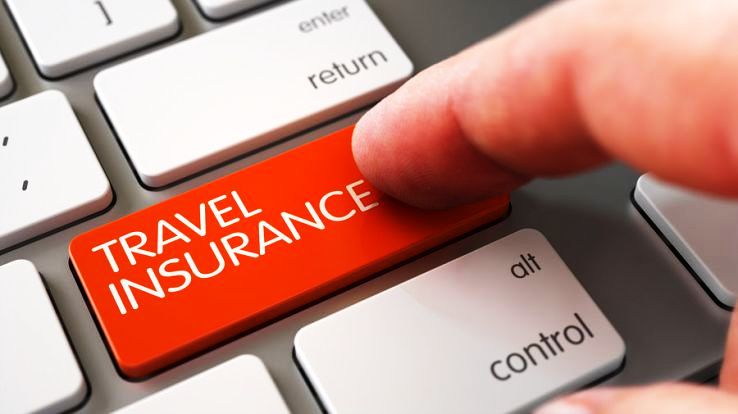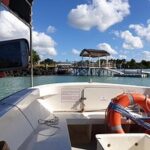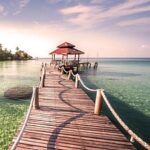TRAVEL INSURANCE
Things that are out of your control can happen when you’re traveling, so insurance comes in handy. Considering the unpredictable nature, remote destinations and conditions encountered on Asia Pioneer Travel tours, it is required to have travel medical insurance. So trip cancellation insurance is highly recommended. If you’re going to spend your hard-earned money to enjoy your holiday – why not spend a bit more to safeguard it?
Upon starting your tour, the Asia Pioneer Travel leader or guide will ask everyone to provide a copy of their insurance details to keep on record. Failure to provide this information can, and has, resulted in travelers being unable to continue on tour, so don’t leave home without it.
You can find the nearby travel insurance agency where you are living to receive your insurance files or purchase them online. See our Travel Insurer section for more details.
What insurance is required?
Travel medical insurance is mandatory. With a wide variety of company, credit card, and travel policies out there, how do you know if your coverage is sufficient for our style of adventure travel?
Our minimum insurance policy coverage for medical emergency evacuation and repatriation is USD$200,000 (or equivalent in other currency). If your pre-existing coverage does not meet these needs, you will be required to purchase travel medical insurance.
Why should I get cancellation insurance?
Adding cancellation insurance to your medical insurance is optional but always recommended. By having ‘all-inclusive’ coverage you do not need to worry about emergencies that can happen any time, any where, before or during your travels. Including the cost of your airfare, as well as your tour(s), ensures that you do not have to worry about any unforeseen situations such as having to rush home to a family member or having a tour changed or cancelled because of a natural disaster.
How much does it cost?
Less than you’d expect! Travel medical insurance is based on the number of days of coverage – so how long you will be away.
All-inclusive insurance, which adds cancellation to your medical insurance, is based on the dollar value of the tours, airfare, hotel nights, and other services being covered.
Typical costs, in USD, on a 10-day tour valued at $1000 with airfare coverage at $1000 as well would be:
- Medical insurance only for 10 days = around $50
- All-inclusive insurance (medical + cancellation) for $2000 (tour + airfare) = around $130
Who should we buy from?
- Cover-More: Choose Cover-More Travel Insurance and benefit from top-quality cover, affordable rates, professional service, and fair claims handling.
- World Nomads: This travel insurance is available to people from over 150 countries and is designed for adventurous travelers with cover for overseas medical, evacuation, and baggage.
- Travel Guard: More than 12,000 travel companies, through virtually every distribution channel in the travel industry, sell Travel Guard.
You can also contact us by email or through our website if you have any other questions about your insurance and booking a trip.

YOUR TRAVEL SAFETY
An Asia Pioneer holiday opens up a world of excitement, wonder, and opportunity. With that, there are inherent risks and rewards beyond which you could reasonably expect by staying at home. Some of the reasons you may be exposed to different and broader experiences and risks include:
- Different countries have different laws and regulations governing transport, infrastructure, safety, etc., which may be lacking compared to laws you may have at home.
- Our itineraries sometimes include strenuous activities and physical demands beyond those you may usually partake in at home. In addition, these activities are on occasion undertaken in remote and isolated areas.
- Natural events such as hurricanes, earthquakes, storms, flooding etc can happen the world over. Sometimes they strike in locations where we operate a tour. The remote location of some of our tours may compound the impacts beyond the natural event itself.
- Most of the people you meet on your travels will be genuine, welcoming, and honest. However, there is a small element preying on the unsuspecting tourist.
- The remote locations of some of our tours mean support and assistance are not always readily available.
- The infrastructure (hospitals, transport, emergency services, etc.) of some of the countries we visit may be lacking when compared to the ones you may have at home.
- Asia Pioneer takes all reasonable measures to ensure your safety and enjoyment while traveling with us. The aim of this document is to give you an insight into ways you may further enhance your own personal safety while abroad. “The door to safety swings on the hinges of common sense.”
Before the trip
There are a number of things that you may prepare before leaving home that will offer you a safe and enjoyable travel experience.
- Take copies of your passport and other important documents with you. This way, if you lose your documents, you can at least present a copy to your embassy or consulate while abroad and have replacement or temporary travel documents issued. A tip we received from one of our seasoned travelers was to scan the documents and send them to your e-mail. That way you have additional access to them online.
- We suggest registering your travel plans with your embassy or consulate before leaving home. Should a serious event occur, your Government will be able to make contact and account for you.
- Take out appropriate insurance. No one ever expects an injury or accident to happen. However, we have a number of unfortunate stories from travelers and they usually start with: “I never expected…”
- Leave a copy of your itinerary with friends or family. Health information
Some of our trips may lead you to exciting off-the-beaten tracks. With that comes exposure to new and unfamiliar bugs, viruses, and infections. Consult your local medical professional well before leaving home. You may need injections to prevent common diseases, and they may need some time to incubate before they are effective. Your medical professional or travel clinic will advise on what is needed.
We also ask you to complete our online medical questionnaire. This will help us provide you with the facilities you need while you are with us and allow us to give special attention to those who need it.
Transport
The travel experience will expose you to many different types and forms of transport, as well as many risks and rewards. Some of these may be familiar to you and just a matter of common sense, and some may not. Take note of the top below tips received from experienced Asia Pioneer travelers:
1. Air travel
- Pay attention to the in-flight briefing. It may seem monotonous or boring to those who travel often, but in the event of an emergency, you will need to know it instantly.
- Count the rows to the emergency exit. In an emergency, lighting may be reduced.
- Don’t drink too much alcohol. Cabins are pressurized, so the effect of alcohol is higher than normal.
- Listen to the flight attendants. They are primarily there for your safety.
- Keep your seatbelt fastened. Turbulence can occur at any time.
2. Buses and trains
- Keep your personal belongings in your sight, or preferably on you.
- A lock placed on zippers is a good deterrent to a would-be thief.
- Watch for uneven, slippery surfaces or other obstacles as you enter and exit the vehicle.
- Remain alert to surroundings. Be aware of distractions, as they may be opportunities for pickpockets.
- Know your stop.
3. Taxies
- If you are staying at a hotel, have them call you a taxi rather than waive one down on the street.
- Use taxis from a taxi stand where possible. Typically, only registered operators may use a taxi stand.
- Keep your belongings at your side or feet. If you need to exit quickly, they will be easily accessible.
- If in an emergency situation, leave the bags. You can run faster without it, and items can be replaced.
- Check the driver’s identification before getting in. If it is a legitimate taxi, it should be prominently displayed in the vehicle.
4. Water transport
- Listen to the safety briefing. You will need to know what to do in an emergency.
- If lifejackets are supplied – use them.
- Always have at least one hand free to hold onto something to help with your balance.
- The sun reflects up off the water. Ensure you have adequate sunscreen protection.
- Take medication for seasickness prior to boarding – it may take some time to become effective.
Accommodation
Accommodation is generally considered a safe haven for weary travelers. However, in reality, it is often the most likely place where accidents and thefts occur. The following things can be done to increase your personal safety, as told to us by fellow travelers:
- When arriving, stay with your bags until they are transferred from the taxi or bus to the Lobby.
- Lobby’s can be chaotic places with many people coming and going. Keep an eye on your bags at all times when checking in and out. The busy atmosphere is a welcome distraction to opportunists.
- When you enter your hotel room, make sure the door closes firmly behind you and it locks.
- When in your room, lock the door, use the security latch, lock windows, and connect room doors.
- Always use the ‘spy hole’ to see who is at the door before opening it.
- Know the emergency assistance number and how to operate the phone system.
- Store all unneeded personal items, cash, valuables, and travel documents in the in-room safe.
- Take note of the emergency plan on the back of the hotel door. You will need to know it in an emergency.
- Place your room key in the same place each time. It avoids losing it, and you will know where it is in an emergency situation.
- Use the non-slip mats in the showers if provided.
Out and about
One of the great ways to experience a new destination is to simply immerse yourself in it! However, as with anywhere, there are selected elements of the local community who prey on the vulnerable. We have received many tips and advise from our travelers on the best way to do reduce vulnerability, protect safety at the same time enjoy the amazing sights. Some of these ideas may be simple while others you may not have thought about. These are the top 10 ways to enhance your personal safety while out and about:
- Blend in as much as possible, especially in your dress and appearance. Try to avoid an obvious tourist appearance.
- View maps discreetly. A map identifies you as a tourist and, unfortunately, a target.
- If disorientated, only ask for directions from uniformed officers or persons of obvious authority.
- Stay on well-lit or well-trafficked areas and roads. Danger often lurks in dark, less-populated areas.
- Photos are a must when traveling. However, keep the camera discrete. Many ‘point-and-shoot’ cameras will fit in your pocket out of sight when not in use. Do not leave larger ones dangling around your neck or other places in plain view.
- When withdrawing money from an ATM, try to do so during daylight, in well-trafficked areas, and use machines that are associated with a recognized bank where possible. As with anywhere, protect your personal PIN number by covering the keypad from prying eyes with your other hand. Once the cash is withdrawn, take time to ensure it is stashed away safely. Do not do so while walking down the street, advertising the fact that you are carrying large amounts of cash with you. Leave excess cash, travel documents, and jewelry in the hotel safe, or better yet, at home if you don’t need them while away.
- An experienced pickpocket can usually pick a tourist out in a crowd. Wear your purse over one shoulder with the opening flap against your stomach so that it’s impossible to get into. If you’re carrying a daypack wear it in front, kangaroo style.
- Where possible, avoid walking alone – especially at night. Traveling with friends makes you much less of a target.
- Take something with the hotel name and address on it with you like a notepad or matchbox. This way, even if you do not speak the language, a taxi will be able to take you back to the hotel.
You can also contact us by email or through our website if you have any other questions about travel safety issues and booking a trip.
MEDICAL ASSISTANCE
When you travel in this region and need medical assistance, Asia Pioneer always recommends that SOS emergency evacuation service be included in a travel package besides Travel Insurance. International SOS emergency air evacuation service is different from Travel insurance. When an accident happens, Asia Pioneer will access the SOS international system immediately.
Scope of Services We Supply
- Travelers are under 75 years old
- Travelers travel to Vietnam, Laos, Cambodia, Thailand, and Indonesia
Medical Assistance
International SOS shall provide travelers, upon request, with the name, address, telephone number, and, if available, office hours of physicians, hospitals, clinics, dentists, and dental clinics during traveling.
International SOS shall not be responsible for providing medical diagnosis or treatment. The services include:
- Arrangement of Hospital Admission: If a traveler’s medical condition is severe enough to require hospitalization, International SOS will facilitate hospital admission.
- Arrangement and Payment of Emergency Medical Evacuation: International SOS will organize air and/or surface transportation and communication to move the traveler to the nearest hospital with appropriate medical care in case of a Serious Medical Condition. International SOS will cover the medically necessary expenses for such transportation and communication, as well as any usual and customary ancillary charges incurred in the process.
International SOS retains the absolute right to decide whether the traveler’s medical condition is sufficiently serious to warrant Emergency Medical Evacuation. Intl.SOS further reserves the right to decide the place to which the traveler shall be evacuated and the means or method by which such evacuation will be carried out, considering all the assessed facts and circumstances of which International SOS is aware at the relevant time.
- Guarantee of Medical Expenses Incurred during Hospitalization: International SOS will assist the traveler by guaranteeing medical expenses incurred during and after hospitalization when authorized by Traveler/Sisters Tours.
- Access with Travel Insurance Company to get reimbursement: International SOS will, on behalf of the traveler, access the Travel Insurance Company and sign a travel insurance contract with the traveler to get reimbursement for the traveler’s loss.
- Delivery of Essential Medicine: International SOS will arrange the delivery of essential medicine, drugs, and medical supplies to the traveler if these items are necessary for the traveler’s care or treatment but are not available at the traveler’s location. The delivery of these items will be subject to local laws and regulations. International SOS will not cover the costs of the medicine, drugs, or medical supplies, as well as any delivery costs.
- Arrangement and Payment of Emergency Medical Repatriation: International SOS will arrange and pay for the return of the traveler to the Home Country by air and/or surface transportation after hospitalization. International SOS reserves the right to decide the means or method by which such repatriation will be carried out, considering all the assessed facts and circumstances of which Intl.SOS is aware at the relevant time.
- Arrangement and Payment of Transportation of Mortal Remains: International SOS will arrange for the transportation of the traveler’s body from the place of death to the home country. They will pay for all reasonable and unavoidable expenses incurred during the air and/or surface transportation arranged by International SOS. Alternatively, they will pay for the cost of burial at the place of death as approved by International SOS, subject to any governmental regulations.
- Arrangement and Payment of Compassionate Visit: International SOS will arrange and cover the cost of one round-trip economy class airfare for a relative or friend to accompany a traveler who is hospitalized outside their home country for more than 7 consecutive days when traveling alone. This is subject to International SOS’s prior approval and will only be provided when deemed necessary by International SOS based on medical and compassionate reasons.
- Arrangement and Payment of Return of Minor Child
Please contact us for further information about SOS International Emergency Air Evacuation Service.





